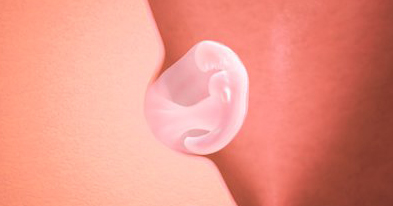
Help your growing baby develop in the fifth week of your pregnancy.
Your growing baby’s body begins to form into cells in week 5. Help your placenta provide key nutrients with a nutritious pregnancy diet.
What’s happening in Week 5 of my pregnancy?
This is the beginning of the embryonic period—when your growing baby’s brain, spinal cord, heart, and other organs begin to form. Towards the end of this week, your growing baby will be the size of the tip of a pen!i
The placenta, which will serve as your growing baby’s source of nourishment, has also started to form.ii
What can you expect in Week 5 of pregnancy?
You can expect a positive pregnancy test – congratulations! You might also notice some very early pregnancy signs, such as fatigue and breast tenderness, frequent urination, and even nausea.
Though there is no sure-fire way to successfully treat pregnancy nausea, there are some treatments that have worked for many women in the past. Some of these are:
-
Taking supplements like Vitamin B6, which has been linked to morning sickness relief.iii
-
Herbal remedies like ginger and chamomile may help reduce nausea and vomiting.iv
-
Acupunctureiv and massage. Acupressure wristbands also work for some women.
-
Anti-nausea medications as prescribed by your doctor.
Remember to consult your healthcare provider first before beginning any treatment. If you suffer from morning sickness, you could also start eating small meals frequently, consisting of foods that don’t trigger your nausea, and remember to stay hydrated.v
What can I do to support my pregnancy in week 5?
Your growing baby’s central nervous system (brain and spinal cord) is quickly developing!vi You can help along your developing baby’s brain growth by consuming 200mgvii of the nutrient DHA, daily. Boost your intake of key nutrients by supporting a healthy diet with a doctor-recommended supplement that includes iron, folic acid, and calciumviii,ix.
If your nausea and fatigue aren’t too taxing, you may want to establish a pregnancy-appropriate exercise routine. This will help your body strengthen and adapt with the extra weight, as well as reduce stress. Regular exercise will also help you bounce back easier after your pregnancy.x
Get your partner involved in your pregnancy right from the very beginning by asking him to come along to key doctor’s appointments (e.g. ultrasound scans), and keep him updated about your developing baby’s growth. This will help ensure a strong bond between all three of you, during the pregnancy and after.
Your growing baby’s development in week 6
References:
- Fetal development: The 1st trimester. (2014, July 10). Retrieved April 12, 2017, from http://www.mayoclinic.org/healthy-lifestyle/pregnancy-week-by-week/in-de...
- Fetal development: The 1st trimester. (2014, July 10). Retrieved April 12, 2017, from http://www.mayoclinic.org/healthy-lifestyle/pregnancy-week-by-week/in-de...
- Vitamin B6 (pyridoxine). (n.d.). Retrieved April 05, 2017, from http://www.mayoclinic.org/drugs-supplements/vitamin-b6/dosing/hrb-20058788
- World Health Organization, WHO recommendations on antenatal care for a positive pregnancy experience. Geneva: WHO Press. 2016. Web. 11 Apr. 201
- Curtis, G. B., & Schuler, J. (2016). Your Pregnancy Week by Week (8th ed.). Philadelphia, PA: DaCapo Pres
- Food and Agriculture Organization of the United Nations,. Fats And Fatty Acids In Human Nutrition: Report Of An Expert Consultation. Geneva: N.p., 2010. Web. 5 Apr. 2017. FAO Food And NutritionPaper.
- World Health Organization, WHO recommendations on antenatal care for a positive pregnancy experience. Geneva: WHO Press. 2016. Web. 11 Apr. 20
- Pregnancy diet: Focus on these essential nutrients. (n.d.). Retrieved April 05, 2017, from http://www.mayoclinic.org/healthy-lifestyle/pregnancy-week-by-week/in-de...
- Your pregnancy: 5 weeks. (2016, June). Retrieved March 20, 2017, from https://www.babycenter.com/6_your-pregnancy-5-weeks_1094.bc

